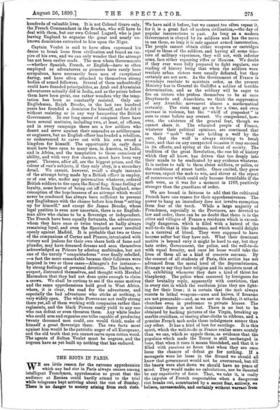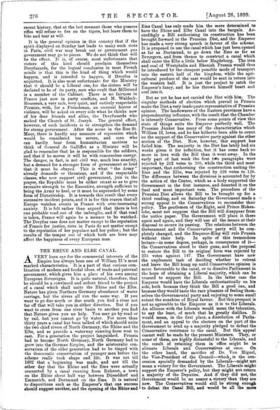THE RIOTS IN PARIS.
WE see little reason for the extreme apprehension which any bad riot in Paris always causes among intelligent Frenchmen, apprehension so great that the audience at Rennes could hardly attend to the trial while telegrams kept arriving about the riot of Sunday. There is no danger to society arising from such riots. We have said it before, but we cannot too often repeat it, for it is a great fact of modern civilisation,—the day of popular insurrections is past. As long as a modern Government is obeyed by its soldiers and has the nerve to use them, so long it is safe against armed insurrection. The people cannot obtain either weapons or cartridges equal to those of the soldiers, and having all some tinc- ture of military experience, they will not, with inferior arms, face either repeating rifles or Maxims. We doubt if they ever were fully prepared to fight regulars, our reading of history being that when the soldiers were resolute urban rioters were usually defeated, but they certainly are not now. As the Government of France is nowadays resolute to maintain order, as the present Ministry has in General de Galliffet a soldier of terrible determination, and as the soldiery will be eager to fire on rioters who profess themselves tO be at once Dreyfusards and Anarchists, we think the suppression of any Anarchic movement almost a mathematical certainty. The riots may go on for a time, and even increase in violence, but the "whiff of grapeshot" is sure to come before any overset. We comprehend, how- ever, the existence of the general fear, though we cannot share it. The educated people of France, whatever their political opinions, are convinced that in their " mob " they are holding a wolf by the ears, that the wolf is always striving to break loose, and that on any unexpected occasion it may succeed iu its efforts, and spring at the throat of society. The tradition of the great Revolution, the one bit of history which they all know, has driven that too deeply into their minds to be eradicated by any evidence whatever. It is useless to talk to them about soldiers, or police, or the conditions of street battle. Once excited, they grow nervous, expect the mob to win, and shiver at the report of occurrences which could only become formidable if the mob were, as it was for a moment in 1789, positively stronger than the guardians of order.
We are bound in fairness to add that the cultivated French have one reason for their apprehensiveness. The power to hang an incendiary does not involve exemption from fear of the torch. While a large majority of Frenchmen, especially in the Provinces, are devoted to law and order, there can be no doubt that there is in the cities and villages of France a residuum which is exceed- ingly dangerous, which is filled with a hatred of the well-to-do that is like madness, and which would delight in a carnival of blood. They were supposed to have become softer but they have not. What their dominant motive is beyond envy it might be hard to say, but they hate order, Government, the police, and the well-to-do with equal ferocity, and once let loose would take the lives of them all as a kind of concrete sarcasm. By the consent of all students of Paris, this section has not advanced from the moral level of ' the Septembriseurs. Strange to say they hate religion and its ministers most of all, exhibiting whenever they dare a kind of thirst for blasphemy. The police when censured by foreigners for their brutality reply, apparently with conviction, that in every riot in which the residuum joins they are fight- ing for their lives ; it is certain that the mob always resorts to lethal weapons—axes and knives, if firearms are not procurable—and, as we saw on Sunday, it attacks churches even in preference to private houses. The dominant desire is not loot. There is no loot to be obtained by hacking pictures of the Virgin, breaking up marble crucifixes, or tearing altar-cloths to ribbons, and a genuine French mob seeks those indulgences sooner than any other. It has a kind of lust for sacrilege. It is this spirit, which the well-to-do in France realise more acutely than we can, which so appals them, as evidence that the populace which made the Terror is still unchanged in tone, that when it rises it means bloodshed, and that it ie filled with passions so fierce that when they are once loose the chances of defeat go for nothing. If a menagerie were let loose in the Strand we should all know that government would not be overturned, but till the beasts were shot down we should have no peace of mind. They would make no calculations, nor be daunted by any superiority of force. That, we take it, is really the impulse of French respectables when a dangerous riot breaks out, accentuated by a secret fear, entirely, we believe, unreasonable, and certainly without warrant from recent history, that at the last moment those who possess rifles will refuse to fire on the tigers, but leave them to bite and tear at will.
It is the general opinion in this country that if the spirit displayed on Sunday last leads to many such riots in Paris, civil war may break out or government qua government may go to pieces. We do not think that will be the effect. It is, of course, most unfortunate that rioters of this kind should proclaim themselves Dreyfusards, for the logical conclusion in most French minds is that this is the kind of thing which would happen, and is intended to happen, if Dreyfus is acquitted. It is also most unfortunate for the Ministry that it should be a Liberal one, for the rioters will be declared to be of its party, men who exult that Millerand is a member of the Cabinet. There is no fairness in France just now in party conflicts, and M. Waldeck- Rousseau, a very rich, very quiet, and entirely respectable Premier, with, for a Frenchman, an unusual horror of violence, will be asked on every side what he thinks now of his dear friends and allies, the Dreyfusards who sacked the Church of St. Joseph. The general effect, however, of such incidents is to strengthen the demand for strong government. After the scene in the Rue St. Maur, there is hardly any measure of repression which would be considered too severe, and men who can hardly bear from humanitarian motives to think of General de Galliffet as a Minister will be glad to remember that he is responsible for the soldiers, and that if he moves it will be with remorseless energy. The danger, in fact, is not civil war, much less anarchy, but a demand for a stronger form of government so loud that • it must be obeyed. This is what " the Army " already demands or threatens, and if the respectable classes, who now support civil government, join in the prayer, the Republic must be either recast so as to give excessive strength to the Executive, strength sufficient to bring the Army to heel, or it must be superseded by some form of Dictatorship. It is towards this result that every successive incident points, and it is for this reason that all Europe watches events in France with ever-increasing anxiety. It is felt rather than argued that there is but one probable road out of the imbroglio, and if that road is taken, France will again be a menace to be watched. The Dreyfus case does not matter except to the reputation of France for justice, riots in Paris do not matter except to the reputation of her populace and her police ; but the results of the temper out of which both are born may affect the happiness of every European man.



































 Previous page
Previous page